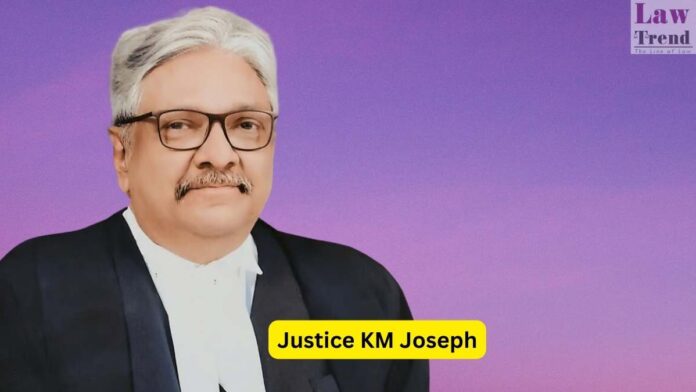Wading into a legal minefield, former Supreme Court judge Kurian Joseph Saturday pitched for an expanded mechanism including at least three judges to decide allocation of cases in the apex court to end the public perception that the “master of roster business” is not being handled the way it should be.
The apex court had in a 2018 judgement said the Chief Justice of India is the “master of the roster” and there is no dispute that he has the “ultimate authority” and the “prerogative” to allocate cases.
“The first main observation I made after my retirement also is that there is a perception of a remote control in the Supreme Court. So, there is a perception in the minds of the public that the master of roster business is not handled the way it should be handled,” he said.

“So, my first suggestion on that master of roster business is that it should be done at least by three (judges), and on the constitution of the benches, particularly very important constitutional matters, the diversity should be reflected — regional, gender — at least these two should be reflected in constituting the benches,” Justice Joseph said.
He was one of the four most senior apex court judges who had held an unprecedented press conference in January 2018 where they raised several issues including about assignment of cases in the top court.
Speaking at a seminar organised by the Campaign for Judicial Accountability and Reforms (CJAR), Justice Joseph said after that press conference, a series of meetings of the incoming chief justices with the four judges took place and there was one suggestion that the master of roster exercise should be appropriately regulated, not controlled, in order to avoid any perceived arbitrariness.
The former apex court judge launched a frontal attack on the media for having failed to defend democracy and the Constitution as he made a spirited call for protecting whistle-blowers.
“We don’t find any fearless, truthful version of the facts coming out. The greatest blow to democracy is that the fourth pillar has failed the country. Forget about the first three pillars. The fourth pillar is the media and they have failed to defend democracy. They have failed to defend the Constitution. They have failed to defend the truth,” he said.
“So our only hope is the fifth pillar, whistle blowers. Somehow they are also not able to blow, maybe post COVID lungs have been affected. The way the lungs are crushed in the country today so that nobody will blow the whistle is a very dangerous trend for the country,” he said.
He also advised constitutional courts to keep in mind that equal importance has to be given to both aspects of Article 21 of the Constitution-life and liberty.
“If you are taking away the liberty part of a person, there is no point in giving him the life part. So, I think, I am of the strong view that our constitutional courts should keep in mind that Article 21 should be understood giving equal importance to both aspects of life and liberty,” he said.
“But the perception now is that life is, of course, guarded but liberty is ignored,” Justice Joseph said while addressing the gathering at the first session of the seminar on ‘Supreme Court Administration and Management:? Issues and Concerns’.
Besides Justice Joseph, former apex court judge Justice Madan B Lokur, former judge of the Delhi High Court Justice Rekha Sharma, senior advocate Meenakshi Arora, and advocates Prashant Bhushan and Kamini Jaiswal also addressed the gathering.
Observing that the Supreme Court has always been considered and conceived as the “guardian” of the Constitution, he said judges take oath that they will uphold the Constitution and laws.
Also Read
“I have seen judges speaking ‘I have done best according to my conscience’.
He has no special and individual conscience. His conscience is only the constitutional conscience. He is the conscience-keeper of the Constitution,” Justice Joseph said.
He said the trend now is if a case is posted to a bench, people are able to predict what the result would be.
Justice Joseph was elevated as a judge of the Supreme Court on March 8, 2013 and retired on November 29, 2018.
Prior to that, he became a judge of the Kerala High Court in July 2000 and was later elevated as the chief justice of the Himachal Pradesh High Court.







